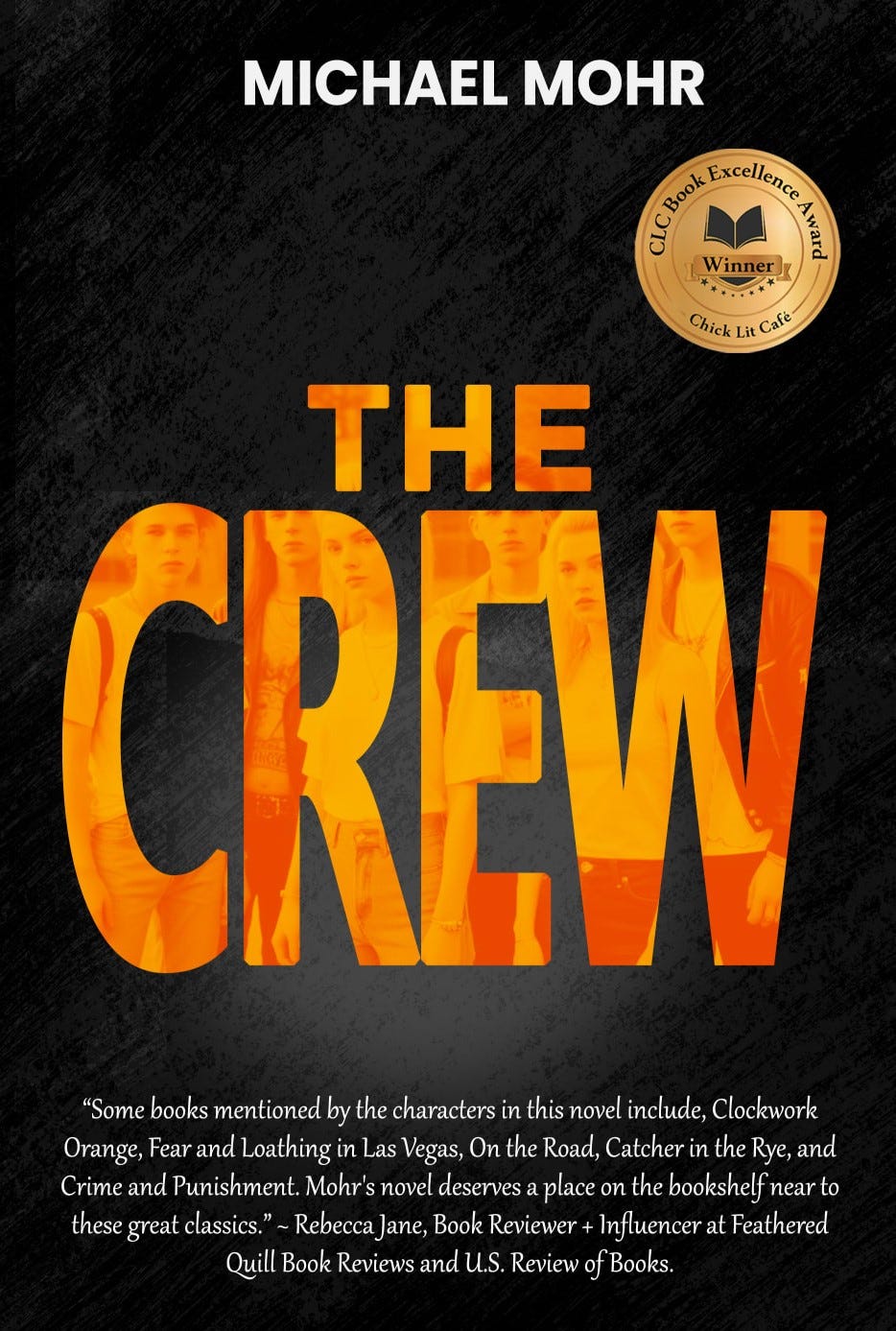
*Good news! My punk/philosophical YA Novel (rejected by dozens of agents who almost took the book) is now published. CLICK HERE TO BUY AND PLEASE REVIEW ON AMAZON.
These literary agent responses are from 2016 and 2017 respectively. (Same novel, different titles.) They’re responses from a YA (Young Adult) punk rock Roman-a-clef literary novel I spent roughly eight years working on, rewriting, revising, honing, polishing.
I must have submitted this novel—which at some point I’d love to serialize on Substack—to 250 agents over the years. Too many by a long shot, and often when it wasn’t ready. By 2015 it’d been in a drawer for a year. Yet something galvanized me to pull it out and tinker again. I reread the book and fell in love with it. This time I hired a freelance editor, a woman who’d been an acquisitions editor with Random House for a decade.
The editor loved the novel and had great feedback. We went back and forth for eight months. When she said if she was still at RH she’d acquire the novel, I knew it was ready.
That’s when I started—in 2016—to get positive agent responses. For the first time. Over the course of six months I received dozens of requests for the full manuscript. After all those years of rejections it felt like arriving at the Holy Land.
The most exciting was the first response below (agent #1): I was teaching at a writers’ conference in Irvine when I got the email. A thrill rushed through my body. I felt like I’d arrived, like this was finally going to be “it.”
What ensued was an initial rejection, but with a request for specific changes for a reconsideration. Then a second rejection, further detail on said desired changes, and a six month wait until a third submission. And then, as you can guess, a final third rejection. After this last one the agent essentially ‘ghosted’ me without a word. I asked briefly and politely for any feedback but…crickets.
Agent #2 is more intriguing from an ideological perspective. This came six months after Trump became president. This agent—a young white woman located in San Francisco—had initially been excited about the book. But it seems after reading it her perspective shifted. I can’t see this myself totally objectively, obviously, and I have my own inherent confirmation bias. I’m curious to hear what readers think. My feeling was then and still is now that she used coded language to basically say: Look, Dude, the writing’s great and all but this is a typical heteronormative white male protagonist from the upper middle class and Trump’s in power; not cool.
I mean look, I get it: Agents are looking out for their own interests; they’re seeking books they feel strongly they can sell to a publisher. They want to get that 10-15%. And of course it’s literature so it’s all subjective anyway. And any agent has a right to turn work down for any reason. I get all of that. My point is this: If publishing more and more myopically seeks ‘minority voices,’ are we sure we’re not losing a whole lotta solid fiction? Clearly there is plenty of minority talent to pull from. And yes: historically, WSM (White Straight Men) have dominated the literary world. But that’s been changing slowly for decades, and extremely quickly over the past decade.
I guess my question is: In this race to seek out new and different voices, is it necessary to jettison everything white? Should agents sneer at white writers, white protagonists, and think, Look, we already had The Catcher in the Rye?
Or: Am I overreacting, over exaggerating, overthinking, being too hostile and sensitive? It’s certainly possible. Perhaps it’s just my deeper resentment and worry that I’m ‘not good enough.’ (Perhaps I’m not.) Should the best, most quality stories rise to the top? Or should the thumb of publishing push the scale down in favor of non-white voices?
Or does none of this matter anymore anyway because ‘legacy’ publishers are going the way of the dinosaurs? We have Substack now, right?
Agent #1
Dear Michael,
Thank you so much for giving me the opportunity to consider THE CANNONBALL COMPLEX.
I love the premise of THE CANNONBALL COMPLEX, and I am sucker for characters who behave badly and face the repercussions. Such great potential for drama and conflict! Fraught parent-child relationship? I'm hooked! And Jack has a strong, engaging voice that immediately pulled me into his story. However, I feel there's some issues with pacing. You write wonderful scenes, but there are passages of summary that threw me out of the text. Also, as strong as Jack's voice is, I wasn't always sure how he feels about what is happening around him. I love that he is making a series of bad decisions, and I want to be deeper in his head and experience his feelings firsthand as he takes that first drink and stays out all night for the first time. I wasn't sure if he actively wants to make those choices or if he is just going along for the ride so he doesn't look bad to D.D. or Cannonball. For these reasons, I have decided to step aside for now.
However, I think these issues could be easily remedied, and If you’d like to revise THE CANNONBALL COMPLEX and resubmit, I would be thrilled to read and reconsider the revision.
Michael, I am so sorry not to offer you representation at this time. It was a difficult decision for me, which it why it took me several weeks to respond to you. I hope that you will consider sending me a revision, but no matter how you decide to proceed with THE CANNONBALL COMPLEX, I wish you the best of luck as you move forward. It's a terrific project, and I know you will have great success.
###
Agent #2
I finally had a chance to sit down with THE CREW, and the not-so-great news, first: I don't think I can sell this right now. The good news is that you've got a very clear style and voice, and I can absolutely see other work of yours selling. Bear in mind, this is just my opinion and feedback, so take it all with a boulder of salt.
The thing with THE CREW is, it's got a solidly middle-to-upper-middle-class protagonist who is disaffected by his relatively privileged lifestyle, and because it's presented as a realistic coming-of-age, I don't necessarily see this being relatable to kids (or editors) in this political climate, especially with the shutdown, the economy, and school shootings being on everyone's mind. Jack feels like a very real kid, and I love that you juxtapose punk with literature--readers, especially, will relate to that.
Another thing I'd consider is, does this really need to be set in 2000? I don't think it does, honestly--I know setting it before the contemporary era helps get around the cell phone problem and all of that inconvenient stuff, but I've spoken with a lot of editors over this past year, who all say that unless there's a very good plot reason to set it in another time, don't. I think you can tell this basic story even if it's grounded in the current time, and it will work. At its heart, it's a dissatisfied, sincere kid looking to find himself and find something that makes him feel alive/an outlet for all his feelings, and that transcends time.
Sometimes your dialogue gets expository, especially when Mom starts lecturing Jack and making him retell her story. I might go through each scene and decide whether you need to dramatize or just narrate that particular point. It achieves the goal of making Mom seem extra-smothering/oppressive, but I think maybe hits the mark TOO well, so she isn't even the slightest bit sympathetic. When Jack helps steal the liquor from her house and goes screeching off into the night, I think that really works: it makes Mom seem well-meaning and heartbroken, but also illustrates that Jack is a jerk to her.
Finally, Anna. Anna comes off as a manic pixie dream girl, and I didn't buy her as a character: I can tell what you were going for, but she struck me as solely there to teach Jack about women and feminism. It did occur to me, though, that having a male member of the crew teach Jack that, instead, would probably reach your male readers a bit better. Since Jack thinks of women as mysterious and confusing (I think this is a universal experience, to be confused by the people you're romantically interested in), it sort of feels like this is part of Anna's schtick; if you've got another guy saying "no, listen, there is plenty of female-written literature/music that will give you insight into women," I think that's more powerful. Also, a lot of girls/women struggle with internalized misogyny, which doesn't benefit anyone, really, and I think you could have a lot of fun with that and Anna.
So, I'm sorry that I have to pass on this one, but please do keep me in mind for other manuscripts!
###
CLICK HERE TO BUY THE BOOK AND PLEASE REVIEW ON AMAZON.



Those rejection letters are so coded that they feel like they were written by spies! Like a rejection letter can feel like espionage. That said, I don't think traditional publishing is going anywhere, especially when it comes to fiction. Even the most dedicated Substacker also wants to publish books. There's a visceral reaction to seeing your book in a store window that doesn't happen anywhere else.
You've hit on a massive problem here. Wokeism is everywhere now, especially within the publishing industry. Agents are virtue signaling left and right, going out of their way to entertain the latest version of identity politics. Most are pasty, white females under the age of 40 who carry massive amounts of white guilt around. Yep, I went there. You need only visit half a dozen literary agent websites to see that they are all the same in terms of what they are "seeking." They all want "underrepresented voices, trans, LGTBQ plus blah, and 'neuro-diverse' characters" whatever that means. Look, I'm a total gay lefty and even I laugh out loud at some of their wants. Their bios are unoriginal and pedestrian - while they demand voices that are new and exciting. So yes, there's a problem. Especially in YA. And you dare to show up with a straight, white guy protagonist? Ha. Have you lost your fucking mind, Michael? (I'd love to read it by the way. Send me the MS?) Stick with it and rewrite only where it makes sense. Your time will come :)